by Deep Green Resistance News Service | May 20, 2017 | Colonialism & Conquest
Featured image: Indigenous protests in Brasilia, April 2017. © VOA
by Survival International
An inquiry established by Brazilian parliamentarians who represent the powerful agribusiness lobby has just published a report calling for the closure of the Indian Affairs Department, FUNAI.
Its findings have been met with outrage and incredulity in Brazil and beyond. Francisco Runja, a Kaingang spokesman said: “Killing off FUNAI is tantamount to killing us, the indigenous peoples. FUNAI is a crucial institution for us; our survival; our resistance; and it’s a guarantee of the demarcation of our traditional territories.”
The report attacks indigenous leaders, anthropologists, public prosecutors and NGOs, including Survival International.
It alleges that FUNAI has become a “hostage to external interests” and calls for dozens of its officials to be prosecuted for backing what it calls “illegal demarcations” of tribal territories.
Yesterday a group of 50 Indians was barred from attending the session in congress discussing the inquiry.
The inquiry took 500 days and the report is over 3,300 pages long. It is a blatant attack on indigenous peoples and a crude and biased attempt to destroy their hard-won constitutional rights.

Mutilated indigenous victim of ranchers’ attack in May 2017. © Anon
It was headed by politicians representing Brazil’s powerful agri-businesses who have long coveted indigenous territories for their own financial gain.
One member, congressman Luis Carlos Heinze, received Survival’s Racist of the Year award in 2014 following his deeply offensive remarks about Brazilian Indians, homosexuals, and black people.
Another member, congressman Alceu Moreira, called for the eviction of tribal people attempting to reoccupy their ancestral lands.
The increasingly hostile, anti-indigenous climate in many sectors in congress is fuelling violence against indigenous peoples. Last month, 22 Gamela Indians were injured following a brutal attack at the hands of local landowners’ gunmen.
FUNAI has suffered severe budget cuts, which have resulted in the grounding of several teams responsible for protecting uncontacted tribes’ territories. This effectively leaves some of the most vulnerable people on the planet to the mercy of armed loggers and land grabbers.
The organization has been greatly weakened. Many staff have been made redundant, and political appointees now run key departments.
In the last five months, it has had three presidents. Earlier this month the second president, Antonio Costa was dismissed. In a press conference he strongly criticized President Temer and Osmar Serraglio, the Minister of Justice, stating that they “not only want to finish off FUNAI, but also public policies such as demarcation of [indigenous] land… This is very serious.”
Yanomami shaman and spokesman Davi Kopenawa said: “FUNAI is broken… it is already dead. They killed it. It only exists in name. A nice name, but it doesn’t have the power to help us.”
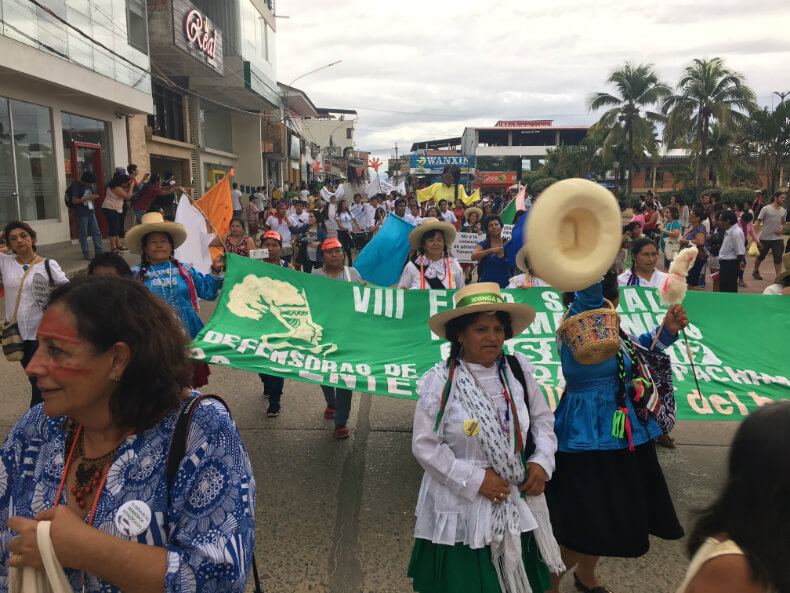
by Deep Green Resistance News Service | May 12, 2017 | Education, Indigenous Autonomy
Featured image: Indigenous women carry the banner of the VIII Pan Amazonian Social Forum (FOSPA) during the opening march from downtown Tarapoto to Universidad San Martin on April 28. Photo: Manuela Picq
by Manuela Picq / Intercontinental Cry
Ever since European colonial powers started disputing borders on its rivers in the seventeenth century, the vast Amazon rainforest—known simply as Amazonia—has been under siege.
Amazon Peoples always resisted the colonial invasion, even after the borders were ultimately settled with the Amazon rainforest getting divided into the territories of nine states. They’ve had no choice. After all, the insatiable lust for ‘wealth at any cost’ did not lessen with time; the siege continued through the nineteenth century, in part with the rubber boom that gave way to the automobile boom.
The attack rages on even now, with the intensive push to extract everything the Amazon holds including oil, minerals, water, and land for agriculture and soy production.
Nations states are leading the land-grab, fostering environmental conflicts that kill nature defenders (most of them indigenous), displace communities, and destroy rivers for megaprojects. The organization Pastoral da Terra estimates that half a million people are directly affected by territorial conflicts in the Brazilian Amazon. About 90% of Brazilian land conflicts happen in Amazonia; 70% of murders in land conflicts take Amazon lives.
That is why people responded to “the call from the forest,” or “el llamado del bosque” in Spanish. This was the motto of the VIII Pan-Amazonian Social Forum, or Foro Social Pan Amazónico (FOSPA), that just gathered 1500 people in the town of Tarapoto, Peru.
The VIII Pan Amazonian Social Forum in Tarapoto, Peru

Photo: Manuela Picq
FOSPA is a regional chapter of the well-established World Social Forum. It is based on the same model that brings together social movements, associations and individuals to find alternatives to global capitalism. From April 28 to May 1, indigenous peoples, activists, and scholars from various parts of Amazonia got together in the campus of Universidad Nacional San Martin.
FOSPA is an important space, not only because the region is at the forefront of the climate crisis but also because it represents 40% of South America and spreads across nine countries—Brazil, Bolivia, Peru, Ecuador, Colombia, Venezuela, Guyana, Suriname, and French Guyana. The 370 indigenous nations in the region are an increasingly smaller part of a booming Amazon population that surpasses 33 million.
This VIII forum was well organized in an Amazon campus with comfortable work space and the shade of mango trees. In the absence of Wi-Fi, participants gathered around fruit juices and Amazon specialties baked in banana leaves at the food fair. The organizing committee, led by Romulo Torres, was most proud of creating the new model of pre-forum. For the first time, there were 11 pre-forums organized in 6 of the 9 Amazon countries to prepare the agendas.
The forum started with a celebratory march through Tarapoto. During three days, participants discussed the challenges of extractive development and land grab across the region. There was in total nine working groups organized around issues such as territoriality, megaprojects, climate change, food sovereignty, cities, education and communication.

During the opening march in defense of Amazonia, Elvira and Domingo, from Ecuador’s Confederation of Indigenous Nationalities of the Amazon (Confeniae) walk along Carlos Perez Guartambel, from the Andean Network of Indigenous Organizations (CAOI) and Ecuador’s Confederation of Kichwa Peoples (Ecuarunari). Photo: Manuela Picq
“Development is the problem”
Speakers strongly criticized models of development based on extractive industries. “Development is the problem, not the solution,” said Carlos Pérez Guartambel, from the Andean Network of Indigenous Organizations (CAOI) and the Confederation of Kichwa Peoples of Ecuador (ECUARUNARI).
Speakers blamed the political left for being equally invested as the right in extractive development, destroying life in the name of development. Toribia Lero Quishpe, from the CAOI and the Council of Ayllus Markas of the Quillasuyu (CONAMAQ) argued that this investment in capitalist gains corrupted the government of Evo Morales, who licensed over 500 rivers to multinational companies.
Gregorio Mirabal, from the Indigenous Network of the Amazon River Valley (COICA) and Venezuela’s Organization of Indigenous Peoples of the Amazon (ORPIA) denounced a massive land grab by the state in the Orinoco region. He said the government is licensing land to mining companies from China and Spain to promote “ecological mining.” Indigenous populations, in turn, have not had a single land title recognized in 18 years and are denied rights to prior consultation.
Ongoing French colonization in Amazonia

A working group discusses the decolonization of power and self-government in Peru. Photo: Manuela Picq
One of the working groups focused on the decolonization of power; French Guyana being the last standing colonial territory in South America.
Rafael Pindard headed a delegation from the Movement for Decolonization and Social Emancipation (MDES) to generate awareness about Amazon territories that remain under the colonial control of France.
Amazon forests constitute over 90% of French Guyana. Delegates described laws that forbid Indigenous Peoples to fish and hunt on their ancestral territories. They explained the mechanisms of forced assimilation—the French state refuses to recognize the existence of six Indigenous Peoples, claiming that in France there is only one people, the French.
The Women’s Tribunal

The forceful participation of women was one of the forum’s most inspiring aspects. Amazon women held a strong presence in the march, plenary sessions and held a special working group on women.
The highlight was the Tribunal for Justice in Defense of the Rights of Pan-Amazonian and Andean Women. Four judges convened at the end of each day to listen to specific cases of women defenders. They heard individual as well as collective cases. Peruvian delegates presented the case of Maxima Acuña, a water defender from the Andean highlands of Cajamarca who faces death threats. Brazilian representatives from Altamira presented the case of the Movement Xingu Vivo para Sempre, which organizes resistance against the Belo Monte Dam.
The Women’s Tribunal also heard cases from across the continent. Liliam Lopez, from the Confederation of Indigenous Peoples of Honduras (COPINH), presented the emblematic case of Berta Cáceres, assassinated in 2016 for leading the resistance in defense of rivers. Delegates from Chile presented the case of Lorenza Cayuhan, a Mapuche political prisoner jailed in Arauca for defending territory and forced to give birth handcuffed.
Initiatives
Many working groups called for a paradigm shift to move away from economic approaches that treat nature as a resource. Participants defended indigenous notions of living well, or vivir bien in Spanish.
There were many initiatives presented throughout the gathering. The working group on food sovereignty proposed to recover native produce and exchange seeds, for instance, through seed banks.

The final proposals of all working groups hang in the main tent allowing participants to add suggestions before the elaboration of the final document. Photo: Manuela Picq
Delegates from the Confederation of Indigenous Nationalities of the Ecuadorian Amazon (CONFENIAE) and the organization Terra Mater presented a collaborative project to protect 60 million acres of the mighty Amazon River’s headwaters – the Napo, Pastaza, and Marañon River watersheds in Ecuador and Peru. The Sacred Headwaters project seeks to ban all forms of extractive industries in the watershed and secure legal titles to indigenous territories.
Wrays Pérez, President of the Autonomous Territorial Government of the Wampís Nation (GTAN Wampís) explained practices of indigenous autonomy. The Wampís, who have governed their territories for seven thousand years, have successfully preserved over a million hectares of forests and rivers in Santiago and Morona, Peru. The Wampís Nation designed its own legal statute based on Peruvian and international law, including those protecting the collective rights of Indigenous Peoples.
Amazon communication

Radio Nave covered FOSPA, organizing live interviews and debates with participants. Photo: Manuela Picq
Many venues emphasized the importance of Amazon communication. All workshops and plenary sessions were transmitted live through FOSPATV and remain available on FOSPA’s webpage.
Community radios and medias covered the forum and interviewed participants, such as Radio Marañón, Radio La Nave, and Colombia’s Radio Waira Stereo 104 (Indigenous Zonal Organization of the Putumayo OZIP).
Documentary films played in the evenings, followed by discussions. The Brazilian documentary film “Belo Monte: After the Flood” played in Spanish for the first time, followed by a debate with people affected by hydro-dams in the Brazilian and Bolivian Amazons. Other films presented include “Las Damas de Azul”, “La Lagrima de Aceite” y “Labaka.”
The Tarapoto Declaration

A plenary assembly announces the final Declaration of Tarapoto, May 1 2017. Photo: Manuela Picq
The forum closed with the Carta de Tarapoto, a declaration in defense of life containing 24 proposals. The declaration collected the key demands of all working groups. It demands that states respect international indigenous rights and recognize integral territories. It invites communities to fight pervasive corruption attached to megaprojects and suggests communal monitoring to stop land-grabbing.
The declaration stresses the shared concerns and alliances of Amazonian and Andean peoples, explicitly recognizing how the two regions are interrelated and interdependent. It denounces state alliances with mining, oil, and hydroprojects. It defines extractive megaprojects as global capitalism and a racist civilizing project.
It echoes FOSPA’s intergenerational dimension, celebrating elders as a source of historical knowledge to guide the preservation of Amazon lifeways. Youth groups, who had their own working group, demanded that states recognize the rights of nature.
Women concerns are the focus of four points. In addition to making the Women’s Tribunal a permanent feature of FOSPA, the declaration calls for the end of all forms of violence against women and the recognition of women’s invisible labor. It asks for governments to detach from religious norms to follow international women rights.
In closing, the declaration expresses solidarity with peoples who live in situation of conflict, whose territories are invaded, and who are criminalized for defending the rights of nature.
It is in that spirit that the organizing committee decided to hold the next FOSPA in Colombia. Defenders of life are killed weekly despite the peace process, revealing a political process tightly embedded in the licensing of territories to extractive industries like gold mining.
The Colombian Amazon is calling. May it be a powerful wakeup call across and beyond the Amazons.
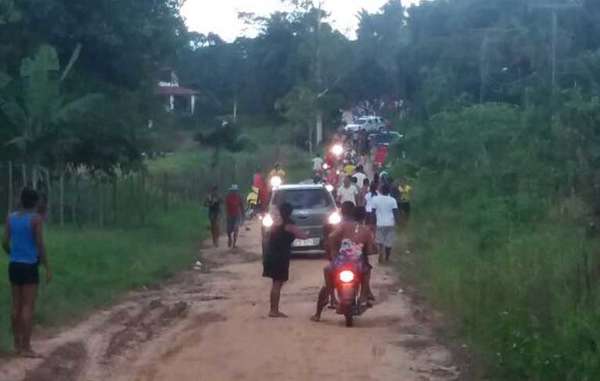
by Deep Green Resistance News Service | May 4, 2017 | Colonialism & Conquest
Featured image: Cellphone photo shows the ranchers on their way to attack the Gamela. A police car accompanies them. © CIMI
by Survival International
Warning: Graphic photos
Thirteen Brazilian Indians have been hospitalized after a brutally violent attack by men armed with machetes in the Amazon.
One man appears to have had his arms severed in disturbing photos released to Survival International.
The attack was in retaliation for the Gamela Indians’ campaign to recover a small part of their ancestral territory. Their land has been invaded and destroyed by ranchers, loggers and land grabbers, forcing the Gamela to live squeezed on a tiny patch of land. The Gamela are indigenous to the area in Maranhão state in northern Brazil.
Powerful agribusiness interests – reportedly including the Sarney landowning family – have been in conflict with the tribe for some time. The family includes a former president of Brazil and a former governor of Maranhão state.

Photo of a victim of the attack, sent to Survival by Brazilian NGO CIMI. © CIMI
Eyewitnesses say that the ranchers gathered at a barbecue to get drunk, before surrounding the Gamela camp, firing guns, and then attacking with machetes, causing grievous injuries. Local police are reported to have stood by and allowed the attack to happen.
The Gamela have received death threats in response to their attempts to return to their land. In a declaration released by Brazilian NGO CIMI, they said: “People are mistaken if they think that by killing us they’ll put a stop to our fight. If they kill us, we will just grow again, like seeds… Neither fear nor the ranchers’ bullets can stop us.”
The attack came just days after massive indigenous protests in Brazil’s capital against proposed changes to Brazil’s indigenous laws, which could have disastrous consequences for tribal peoples.
Land theft is the biggest problem tribal peoples face. Around the world, industrialized society is stealing tribal lands in the pursuit of profit.
Campaigners fear that the close ties between Brazil’s agribusiness lobby and the Temer government installed after the impeachment of Dilma Rousseff in 2016 could lead to further genocidal violence and racism against Brazilian tribal peoples.
Survival’s Director Stephen Corry said: “Right now, we’re witnessing the biggest assault on Brazilian Indians for the last two generations. This truly horrific attack is symptomatic of a sustained and brutal onslaught which is annihilating indigenous communities across the country. Heinous acts like this won’t end until the perpetrators are prosecuted and Brazil starts enforcing tribal land rights as it should do under national and international law.”
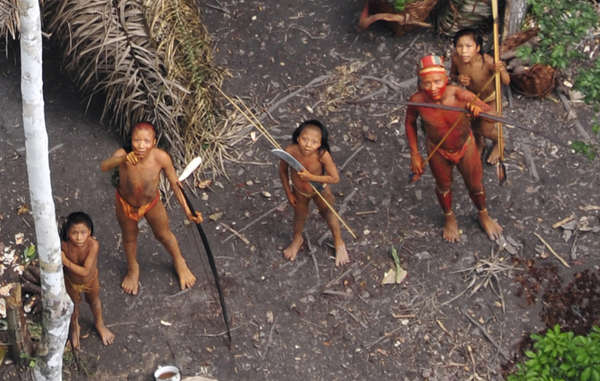
by Deep Green Resistance News Service | Apr 26, 2017 | Colonialism & Conquest
Featured image: Uncontacted tribes, like this one pictured in aerial footage seen around the world in 2011, now face genocidal attacks as Brazil’s government slashes funding for protection of their land. © G.Miranda/FUNAI/Survival
by Survival International
All the government units currently protecting Brazil’s uncontacted tribes from invasion by loggers and ranchers could be withdrawn, according to information leaked to Survival International. The move would constitute the biggest threat to uncontacted Amazon tribes for a generation.
Agents from FUNAI, the country’s indigenous affairs department, perform a vital role in protecting uncontacted territories from loggers, ranchers, miners and other invaders. Some teams are already being withdrawn, and further withdrawals are planned for the near future.
Thousands of invaders are likely to rush into the territories once protection is removed.
There are estimated to be over 100 uncontacted tribes in Brazil, well over two-thirds of the global population of uncontacted people. Many of them live in indigenous territories, which total over 54.3 million hectares of protected rainforest, an area about the size of France.
These territories are guarded by just 19 dedicated FUNAI teams. It is possible that all 19 teams could be eliminated from the Brazilian state budget, despite the fact that money spent maintaining these teams is equal to the average salaries and benefits paid to just two Brazilian congressmen per year.
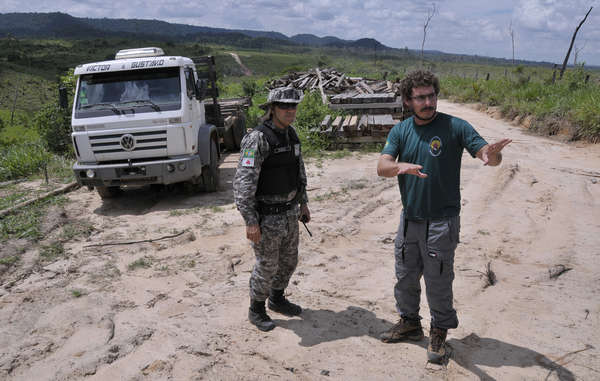
FUNAI agents in Brazil. Ground teams work full-time to keep invaders out of uncontacted tribal territory, but this vital protection could be withdrawn.
© Mário Vilela/FUNAI
The proposals are the latest in a long list of actions from the Temer government, which came to power in 2016 after the impeachment of Dilma Rousseff, that could have catastrophic consequences for indigenous peoples.
Indigenous activist Sonia Guajajara said: “By cutting down the FUNAI budget, the government is declaring the extinction of indigenous people.”
Paulo Marubo, an indigenous man from the Javari Valley in Brazil’s Amazon said: “If the protection teams are withdrawn, it will be like before, when many Indians were massacred and died as a result of disease… If the loggers come here, they will want to contact the uncontacted, they will spread diseases and even kill them.”
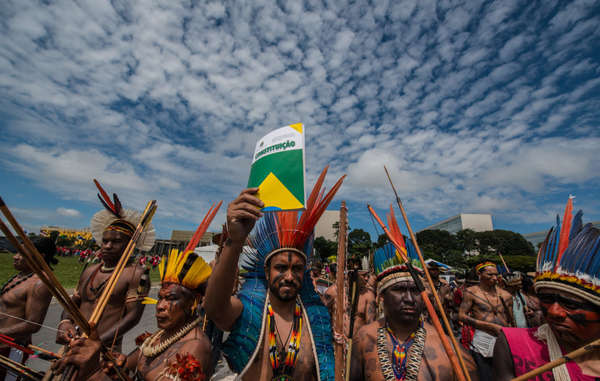
Indigenous protestors in Brasilia, Brazil.
© Fabio Nascimento / Mobilização Nacional Indígena
Campaigners have suggested that the government’s close ties to Brazil’s powerful ranching and agribusiness lobbies – which consider indigenous territories to be a barrier to their own expansion – could be part of the reason for the proposal.
Major indigenous protests are taking place this week in Brasilia against government proposals to water down protection for indigenous rights.
Uncontacted tribes are the most vulnerable peoples on the planet. Whole populations are being wiped out by violence from outsiders who steal their land and resources, and by diseases like flu and measles to which they have no resistance.
Survival International is leading the global fight for uncontacted tribes’ right to their land, and to determine their own futures.
Survival’s Director Stephen Corry said: “Cuts in government budgets to protect uncontacted tribes are clearly nothing to do with money – the sums involved are tiny. It’s a political move from agribusiness which sees uncontacted tribes as a barrier to profit and is targeting rainforest which has been off-limits to development. The reality is these cuts could sanction genocide.”
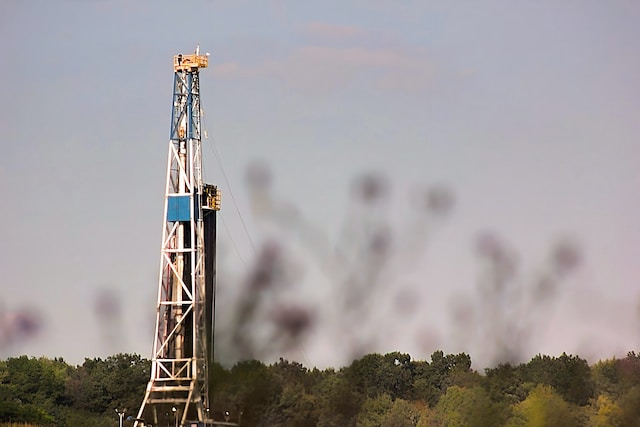
by Deep Green Resistance News Service | Apr 25, 2017 | Lobbying, NEWS
Featured image: Fracking well. The damage that causes earthquakes seems to occur after the drilling, when the wastewater is injected deep underground, stimulating existing fault lines. Indigenous and other communities want Colombia to join France, Germany, Scotland and Bulgaria in banning fracking. By Thinkstock.
by Rick Kearns / Indian Country Today Media Network
Fracking is coming to indigenous Colombian territories and other parts of the country, and activists are trying to halt the process.
The controversial process known as fracking, short for hydraulic fracturing, involves injecting water, sand and various chemicals at high pressure into subterranean rocks, so as to force open existing fissures and extract oil or gas.
Environmentalists, scientists and others around the world have asserted that fracking can contaminate surface water and subterranean aquifers and has been linked to earthquakes and low birth rates among other things. At least four countries – France, Germany, Scotland and Bulgaria – have banned fracking and other countries and regions are considering similar measures.
On March 22, close to 40 environmental organizations, trade unionists and land defenders known as the Alliance for a Colombia Free of Fracking sent a public letter to Colombian President Juan Manuel Santos, asking him to issue a moratorium on fracking due to it’s potential harm to the environment and to thousands of Indigenous and other Colombians living near the wells.
According to an April report, the Colombian government had granted 43 gas and oil concessions to various corporations including multinationals such as ExxonMobil. ConocoPhillips and Drummond Ltd.
The activists note in the letter that fracking has been associated with increased seismic activity. They point to a study showing how wastewater fracking wells in Oklahoma cause a dramatic increase: from 50 seismic events at a level of 3 in 2010 to 400 level 3 earthquakes in 2014, an 800 percent jump.
“And in terms of public health,” the Alliance letter continued, “there are studies from the U.S., Canada and the European Union that connect the proximity of people to the areas where fracking activities are carried out with cases of neural tube alterations (The neural tube is the structure in the embryo that ultimately forms the brain and spinal cord), births with low birth weight, other birth defects and an increase in the incidence of congential heart problems.”
The activists asserted that “there is evidence that emissions from wastewater fracking wells can travel through the air to residential zones where they can cause asthma…”
Some of the fracking areas overlap with Yupka, Wiwa and Wayuu territories and activists have noted that these projects would violate the land rights of these Indigenous Peoples and potentially others.
While none of these communities have issued press statements regarding fracking, two of the largest Indigenous organizations have identified the process as a serious problem in past reports.
In September of last year, the National Indigenous Organization of Colombia (ONIC) published a statement by the allied Association of Indigenous Councils of Northern Cauca (ACIN) about the peace process between the government and the FARC guerillas. In that statement they pointed out that the Indigenous communities were worried about the government’s policies involving “extractavism” and “fracking” and the lack of prior consultation of the communities which is against Colombian and international laws.
In response to the recent developments the Alliance group known as the Corporation for the Defense of Water, Territory and Ecosystems (CORDATEC) held a two day conference on April 19 and 20 on “The Social-Environmental Impact of Fracking” in an area already affected by gas exploration.
Among the panel topics at the conference were “Environmental Impact” and “Resistance and Social Conflicts.”
As of press time President Santos had not publicly responded to the letter from the Alliance.
Photo by Brad Weaver on Unsplash















